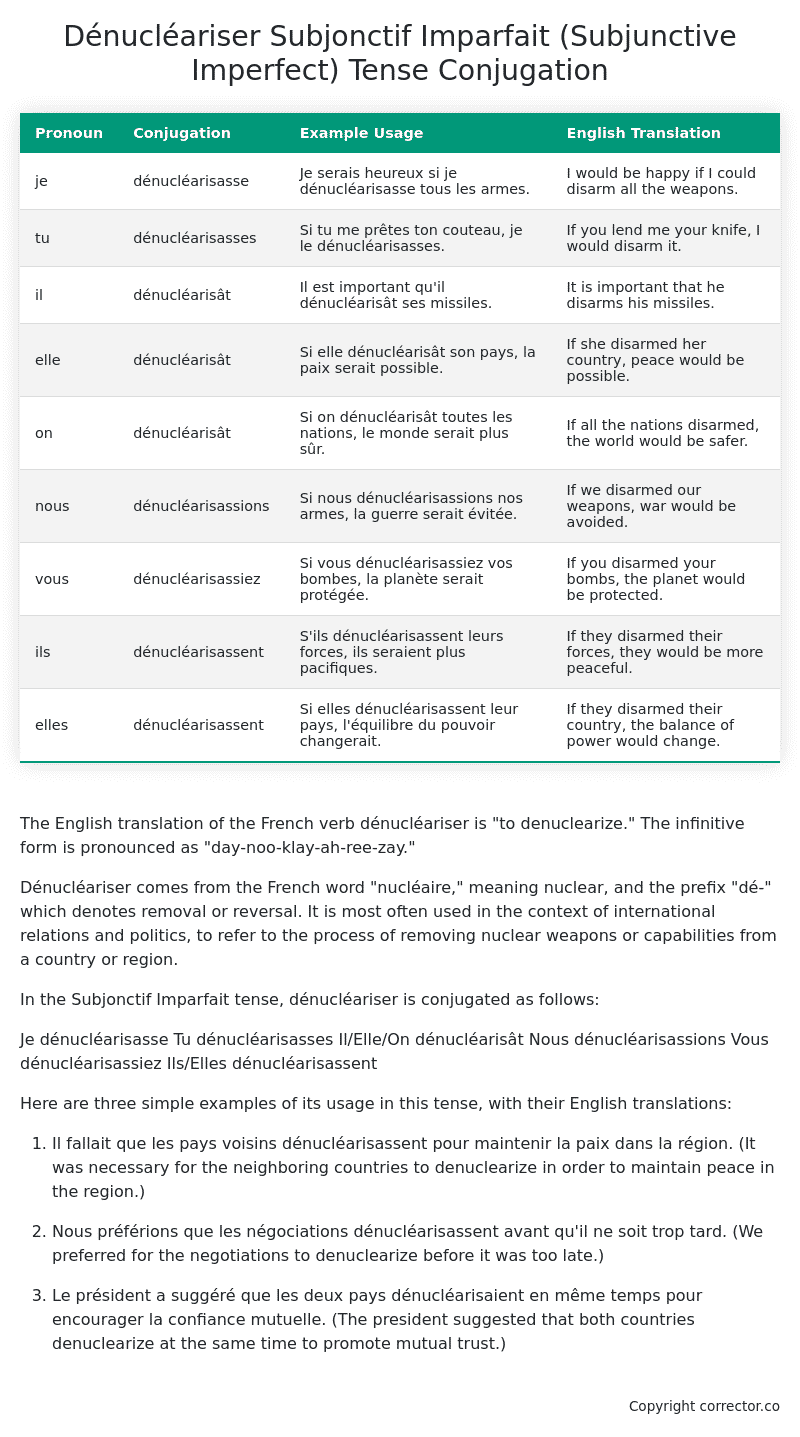Subjonctif Imparfait (Subjunctive Imperfect) Tense Conjugation of the French Verb dénucléariser
Introduction to the verb dénucléariser
The English translation of the French verb dénucléariser is “to denuclearize.” The infinitive form is pronounced as “day-noo-klay-ah-ree-zay.”
Dénucléariser comes from the French word “nucléaire,” meaning nuclear, and the prefix “dé-” which denotes removal or reversal. It is most often used in the context of international relations and politics, to refer to the process of removing nuclear weapons or capabilities from a country or region.
In the Subjonctif Imparfait tense, dénucléariser is conjugated as follows:
Je dénucléarisasse
Tu dénucléarisasses
Il/Elle/On dénucléarisât
Nous dénucléarisassions
Vous dénucléarisassiez
Ils/Elles dénucléarisassent
Here are three simple examples of its usage in this tense, with their English translations:
-
Il fallait que les pays voisins dénucléarisassent pour maintenir la paix dans la région. (It was necessary for the neighboring countries to denuclearize in order to maintain peace in the region.)
-
Nous préférions que les négociations dénucléarisassent avant qu’il ne soit trop tard. (We preferred for the negotiations to denuclearize before it was too late.)
-
Le président a suggéré que les deux pays dénucléarisaient en même temps pour encourager la confiance mutuelle. (The president suggested that both countries denuclearize at the same time to promote mutual trust.)
Table of the Subjonctif Imparfait (Subjunctive Imperfect) Tense Conjugation of dénucléariser
| Pronoun | Conjugation | Example Usage | English Translation |
|---|---|---|---|
| je | dénucléarisasse | Je serais heureux si je dénucléarisasse tous les armes. | I would be happy if I could disarm all the weapons. |
| tu | dénucléarisasses | Si tu me prêtes ton couteau, je le dénucléarisasses. | If you lend me your knife, I would disarm it. |
| il | dénucléarisât | Il est important qu’il dénucléarisât ses missiles. | It is important that he disarms his missiles. |
| elle | dénucléarisât | Si elle dénucléarisât son pays, la paix serait possible. | If she disarmed her country, peace would be possible. |
| on | dénucléarisât | Si on dénucléarisât toutes les nations, le monde serait plus sûr. | If all the nations disarmed, the world would be safer. |
| nous | dénucléarisassions | Si nous dénucléarisassions nos armes, la guerre serait évitée. | If we disarmed our weapons, war would be avoided. |
| vous | dénucléarisassiez | Si vous dénucléarisassiez vos bombes, la planète serait protégée. | If you disarmed your bombs, the planet would be protected. |
| ils | dénucléarisassent | S’ils dénucléarisassent leurs forces, ils seraient plus pacifiques. | If they disarmed their forces, they would be more peaceful. |
| elles | dénucléarisassent | Si elles dénucléarisassent leur pays, l’équilibre du pouvoir changerait. | If they disarmed their country, the balance of power would change. |
Other Conjugations for Dénucléariser.
Le Present (Present Tense) Conjugation of the French Verb dénucléariser
Imparfait (Imperfect) Tense Conjugation of the French Verb dénucléariser
Passé Simple (Simple Past) Tense Conjugation of the French Verb dénucléariser
Passé Composé (Present Perfect) Tense Conjugation of the French Verb dénucléariser
Futur Simple (Simple Future) Tense Conjugation of the French Verb dénucléariser
Futur Proche (Near Future) Tense Conjugation of the French Verb dénucléariser
Plus-que-parfait (Pluperfect) Tense Conjugation of the French Verb dénucléariser
Passé Antérieur (Past Anterior) Tense Conjugation of the French Verb dénucléariser
Futur Antérieur (Future Anterior) Tense Conjugation of the French Verb dénucléariser
Subjonctif Présent (Subjunctive Present) Tense Conjugation of the French Verb dénucléariser
Subjonctif Passé (Subjunctive Past) Tense Conjugation of the French Verb dénucléariser
Subjonctif Imparfait (Subjunctive Imperfect) Tense Conjugation of the French Verb dénucléariser (this article)
Conditionnel Présent (Conditional Present) Tense Conjugation of the French Verb dénucléariser
Conditionnel Passé (Conditional Past) Tense Conjugation of the French Verb dénucléariser
L’impératif Présent (Imperative Present) Tense Conjugation of the French Verb dénucléariser
L’infinitif Présent (Infinitive Present) Tense Conjugation of the French Verb dénucléariser
Struggling with French verbs or the language in general? Why not use our free French Grammar Checker – no registration required!
Get a FREE Download Study Sheet of this Conjugation 🔥
Simply right click the image below, click “save image” and get your free reference for the dénucléariser Subjonctif Imparfait tense conjugation!

Dénucléariser – About the French Subjonctif Imparfait (Subjunctive Imperfect) Tense
Formation
Common Everyday Usage Patterns
Interactions with Other Tenses
Subjonctif Présent
Indicatif Passé Composé
Conditional
Conditional Perfect
Summary
I hope you enjoyed this article on the verb dénucléariser. Still in a learning mood? Check out another TOTALLY random French verb conjugation!


